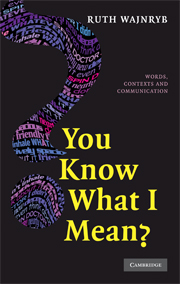Summary
This chapter contains ten sections that variously illustrate the complex behaviours to which words are subject. Many are the shaping influences that motivate how words behave. Sometimes the influences are historical, and here etymology and word borrowings can explain a lot. Sometimes it is a word's morphology (the shape of the word, seen as a total of its meaningful bits), such as the role of affixes (prefixes and suffixes), which determines meaning. Sometimes, as in the case of euphemisms, we see how social attitudes shape the perception of acceptability and necessitate alternative expressions, at least for a while, until the stigma catches up. Sometimes certain aberrant behaviours (for example, backformations) can break all the rules and generate their own new subset of patterned behaviour.
Either a borrower or a lender be
While it is in the nature of language to change, people can feel varying levels of discomfort when they encounter shifts and nuances with which they're not familiar. Linguist David Crystal in The Cambridge Encyclopedia of the English Language urges upon us the metaphor of the tides – a gently constant and inevitable ebbing and flowing, where change is intrinsic, not to be derided or feared, nor even, indeed, wondered at.
Many are the faces of change. One is found in semantic shifts over time, with words having meanings today that are different from those they had in the past. A ‘villain’ used to mean a farm labourer; ‘sly’ once meant wise; ‘vulgar’ once meant ordinary.
- Type
- Chapter
- Information
- You Know what I Mean?Words, Contexts and Communication, pp. 23 - 45Publisher: Cambridge University PressPrint publication year: 2008



